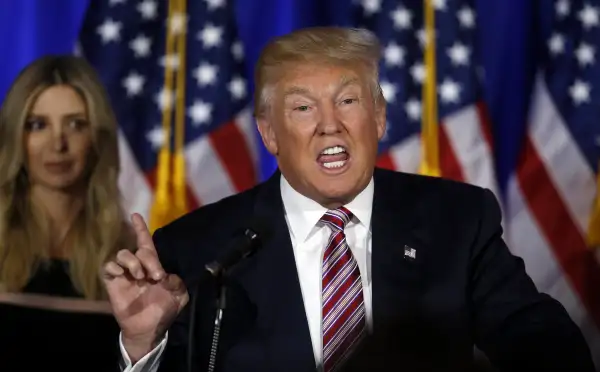Trump and the GOP Find a New Target: The Soda Tax

Last week, Philadelphia passed a tax on soda and other sugary drinks. It took a couple of days for the election news to catch up, with all eyes on Orlando, but by Saturday, as if on cue, the campaign machinery started up, with Donald Trump slamming it on Facebook.
“Crooked Hillary Clinton has endorsed Philly's soda tax,” Trump posted, “which violates her pledge to not support taxes on the poor and middle class.”
You’ve got to be super-surprised by this, right? Or did you think it would take longer before you started hearing how the government is coming for your Pepsi?
That soda taxes would be thrown into the usual set of evil big government talking points barely feels like news. Here’s one thing that is surprising, though: Just a month and a half ago, Republicans and Democrats were not very clearly divided on this issue. A Vox-Morning Consult poll of 1,976 voters found that 24 percent of Democrats strongly support soda taxes--and 19 percent of Republicans do, too. A quarter of Democrats, and 31 percent of Republicans were strongly opposed. Yes, there’s a partial difference, but it’s not a very big one. It’s “a much smaller difference than many other policy issues,” wrote analyst Mary Ellen McIntire.
Now the polarizing machinery of the campaign has kicked into gear. The Republican National Committee put out a brief attacking the legislation, calling it out as a “regressive” tax that hits the poor hardest. Trump picked it up the next day, and now soda taxes can get added to the long list of issues on which opinion gets predictably divided on party lines. But before you let your opinions crystallize, it’s worth laying out what the issues are.
• It’s a big tax, and to some degree it is indeed regressive. At 1.5 cents an ounce the soda tax, adds up to 18 cents on a can of soda, or $2.16 for twelve pack. With 12 cans of soda often selling for $4.99 at the supermarket. That's more than a 40 percent markup. In general, sales taxes hit middle-income consumers (who spend their money) harder than upper income ones (who invest it, or spend more of it on things like houses). This is exacerbated by class differences. According to Gallup, close to half of Americans in families that earn more than $75,000 a year say they don’t drink soda. For those earning under $30,000, it’s 36 percent. If you happen to do your grocery shopping out of the city in the suburbs, well, then no tax.
• That said, the claim that Republicans oppose the tax mainly because it hits the poor and middle class is hard to swallow. Indeed, there are liberals, including Bernie Sanders, who objected to the tax on the grounds that it hits those at lower income levels hardest. But for the GOP the “regressive” claim has become one of a standard list of talking points: Taxes on the poor and middle class are wrong because they are “regressive”; taxes on the wealthy are wrong because they hurt the economy. Really, it comes down to no new taxes, full stop.
• The other big objection to the soda tax -- one that the GOP emphasizes less but that’s clearly on everyone’s mind -- is that hardly anyone truly loves having the state dictate lifestyle choices. Let’s face it, there’s is something patronizing about legislators telling you, no, you’ve had too much sugar and you're acting hyper. Whether the health rationale actually works for these kinds of taxes is debatable. In one country that passed a nationwide soda tax (we’ll get to what that country is in a second) the evidence is mixed, with one study finding that consumption of soft drinks fell 8 percent after the tax went into effect, but data show that soda sales are now rebounding. Philadelphia’s mayor and other soda-tax proponents were careful to present the tax as less a public health law than a revenue raising measure.
• Speaking of raising revenue ... The big draw in Philadelphia was not the old line that taxing soda would stop people from taking in all that nasty sugar. It might cut consumption, but that’s not, as the New York Times’s Margot Sanger-Katz reported it in an influential article really the point. What city officials sold to voters, wasn't healthier living, but “a giant pot of money to fund popular city projects.” The sweetened beverage money is largely earmarked for universal preschool programs, with some going to libraries and parks.
You might do well to write down what your opinion of soda taxes is now -- or even better, what it was before it became a national issue. Consider whether you may have been one of the 24 percent of Democrats who hated the beverage tax idea. Or one of the 19 percent of Republicans who strongly supported it.
As the campaign progresses, opinions like this, as on everything, may well get more polarized. And it may be hard to remember then just what you thought of it before the attack machinery started to tell you this had to be a matter of principle rather than a local issue of “What are we going to get in exchange for our tax money?” Because when the national presidential race is over, that’ll still be the best question to ask about local soda taxes.
Oh, and the country that started charging a nationwide soda tax in 2014? It’s Mexico. Let’s not even think about just what happens when that makes it into the soda tax talking points.
